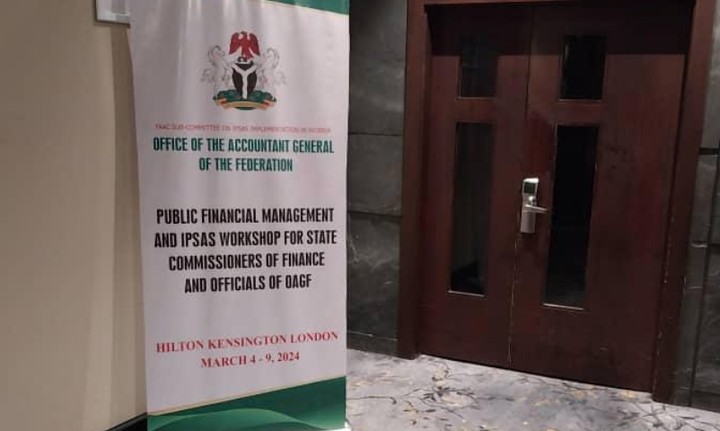The office of the accountant-general of the federation (OAGF) held a workshop on public financial management and international public sector accounting standards (IPSAS) in London, the United Kingdom.
It was learnt that the workshop was held at Copthorne Tara Hotel, Kensington London, from March 4 to March 9, 2024.

The workshop was titled, ‘Public Financial Management and IPSAS Workshop for State Commissioners of Finance and Officials of OAGF’.
According to the event’s brochure, the five-day programme was attended by the federation account allocation committee’s (FAAC) sub-committee on IPSAS implementation in Nigeria, office of the accountant-general of the federation, Abuja.
The topics covered during the workshop include IPSAS — overview, objectives and impact on accountability; IPSAS board strategy and work programme 2024-2028 — challenges of IPSAS implementation in Nigeria; and key issues in the preparation of IPSAS-compliant financial statements.
Others include accounting and reporting in a hyperinflationary economy, public financial management (PFM) in Nigeria — implementation and challenges, budget implementation in Nigeria and challenges.
Part of the workshop activities also included a courtesy visit to the high commissioner of the Nigerian high commission in London.
The sessions started at 10 am daily and ended at 2:30 pm, with participants departing on March 9, 2023, to their various destinations.
WHY WORKSHOP WAS HELD IN LONDON
Speaking on the rationale behind holding the workshop in the UK, Bawa Mokwa, director of press at the accountant-general’s office, said the event is organised annually and was not a one-off meeting.
“It is an annual event. The OAGF members present at the meeting are sub-committees of FAAC,” he said.
“Members of the implementation committee are commissioners of finance of the 36 states.”
Mokwa said the event was held in the UK because the facilitators are residents of the country.
“They usually go to the UK to do it annually because the resource persons are resident in the UK and they implement it to the letter,” he said.
The spokesperson said the event was approved by the National Economic Council (NEC).
Nigeria is currently facing a chronic foreign exchange (FX) crisis that is worsening the plight of businesses — particularly manufacturers — amid a prolonged economic hardship that began following the petrol subsidy removal and naira float policies by the incumbent government.
Although significant efforts have been made to clear the $7 billion FX backlog, the country still has about $1.8 billion outstanding.







